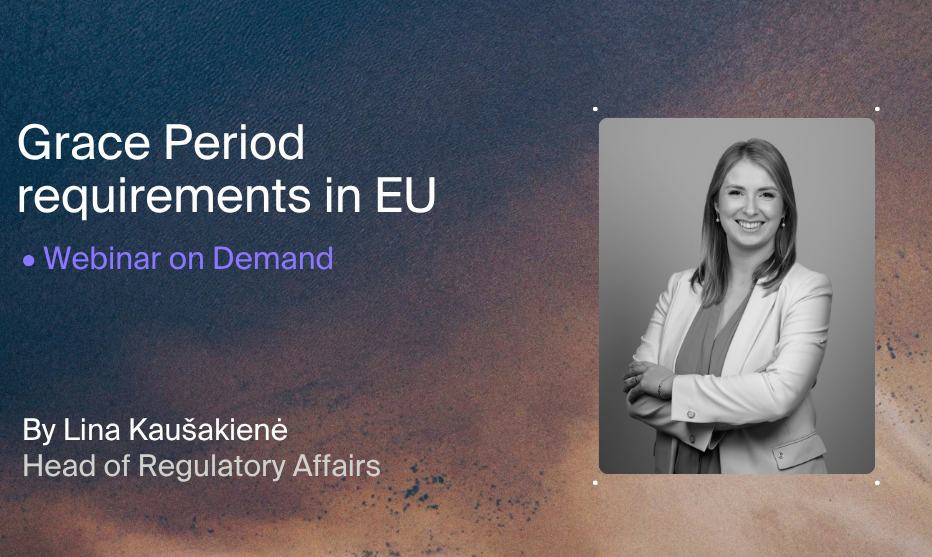
Digitalization is a trend that is affecting society, including medicines. Europe needs globally competitive regulatory system that can keep pace with science and technology evolution and supports future innovations. e-PI is an important part to simplify, accelerate and optimise regulatory processes. Ultimately, the goal is to have e-PI only for all products. The focus of the Pilot projects for e-PIs is to test the feasibility, effectiveness, and practicality of transitioning from traditional paper leaflets to digital formats for all medicinal products. Specifically, the Pilot projects aimed to address several key objectives, such as equivalence verification, user accessibility, technical Integration, regulatory efficiency, multinational implementation, environmental impact.
The benefits of e-PI are the following: timely access to up-to-date information in patient`s language at point of need, easier handling of medicine shortages, optimizing signal validation, simplifying supply chains, support multinational tendering, administrative efficiencies, not to mention the result of environmental impact and waste. In general, it is expected that abandoning the paper-PI increases availability and flexibility, contributes to sustainability and efficiency, supports experimentation, simplification and digitalization. Also, the main goal is to verify the equivalence of the electronic and paper information leaflet.
e-PI Pilot projects in Denmark, the Netherlands, Spain, and Sweden
From July 2023 to August 2024, EMA, alongside a group of EU national competent authorities, conducted a year-long Pilot project to test the use of ePI in Denmark, the Netherlands, Spain, and Sweden. The project enabled companies to generate and manage ePIs during regulatory procedures through the Product Lifecycle Management Portal (PLM). This Pilot resulted in the successful creation and publication of ePIs during real regulatory procedures conducted by EMA and the National Competent Authorities (NCAs) in Spain (AEMPS), Denmark (DKMA), the Netherlands (MEB), and Sweden (MPA).
Key performance indicators (KPIs) were defined before the Pilot, setting targets for ePI creation time, the success rate of ePIs from co-opted procedures, the usability of ePI tools on the PLM portal, the value of guidance materials, the feasibility of proposed business processes, and the evaluation of editor functionality. Most KPIs were met or exceeded, except for the editor functionality. Specific issues arose with the editor’s ability to add sections, format content pasted from Word, and insert images and tables, which did not fully meet the KPI targets. These issues will be addressed in the planning of future ePI projects. The recommendations call for enhanced guidance to support users, as well as updates to business processes to integrate ePI alongside existing practices with minimal disruption.
The Pilot revealed several areas for further development and improvement, but no critical issues were identified that would hinder the integration of electronic product information into regulatory processes as an addition to existing procedures. As a result, the Pilot’s overall conclusion is that the network should move forward with ePI implementation, building the tools and guidance already developed and incorporating the recommendations from the report. This will encourage all parties involved – regulatory bodies, the pharmaceutical industry, medicine information providers, and patient and healthcare professional representatives – to include ePI in their planning and preparations. The development and enhancement of ePI functionality on the PLM portal is ongoing, with a focus on essential features for the initial go-live. Once these features are fully integrated, ePI is expected to be introduced on a voluntary basis, starting with centrally authorized products (CAPs). Following this, early adopter national competent authorities (NCAs) will implement ePI, with broader rollout across NCAs in a phased manner, taking into account the readiness and resources of each Member State.
e-PI Pilot project in Portugal
Portugal is actively participating in initiatives to implement e-PI to enhance patient access to up-to-date medicinal product information. In 2023, a Pilot project was launched focusing on hospital-use medicines, with plans to expand to a broader range of hospital products. Led by APFH (Portuguese Association of Hospital Pharmacists), APIFARMA (Portuguese Association of the Pharmaceutical Industry), and EQUALMED (Portuguese Association of Medicines for Equity in Health), the initiative will run for at least two years, allowing hospital pharmaceutical services to access updated medicine information via INFARMED, I.P.’s Infomed database. The shift to e-PI is expected to improve medicine availability, speed up manufacturing, and support multilingual labeling, while also reducing environmental impact.
The project aligns with similar EU initiatives and the European Commission’s efforts to promote digital access to medicine information. An annual evaluation, based on hospital and pharmaceutical company feedback, will determine whether to extend the Pilot’s scope. The goal is to demonstrate that electronic access provides the same level of safety and effectiveness as paper leaflets, facilitating informed decision-making by patients and healthcare professionals.
Pharmaceutical companies can apply to include their medicines in the Pilot via the eFi application form. Even after the project launches, new applications will be accepted. When medicines are supplied without paper leaflets, the marketing authorization holder must notify INFARMED and the respective hospital pharmaceutical services, ensuring proper tracking and communication.
e-PI Pilot projects in Belgium & Luxembourg
The e-PI Pilot project was launched on 1 August 2018 in Belgium and Luxembourg, driven by the pharmaceutical industry and supported by national competent authorities and hospital pharmacists’ associations. The project, initially set for two years, aimed to demonstrate that the electronic leaflet could serve as an equivalent to the traditional paper version.
The Pilot surveys recognized that when the respondent hospital pharmacists had to consult the e-PI, 96% of them viewed the e-PI online, with only 4% requiring a printout from the online source. Furthermore, for 98% of the respondent hospital pharmacists, the absence of the paper PI did not affect their daily practice in a negative way, or in their obligation to respond to questions from doctors or other HCPs. The results also show that patients very infrequently demand the PI of their medicine. Accordingly, 98% of the respondent hospital pharmacists would be in favor of the removal of the paper PI from all hospital-only medicines. [1]
The stakeholders involved in the Pilot project, including hospital pharmacists, other healthcare professionals, and pharmaceutical companies, consider the insights gained from this initiative to be a valuable source of empirical evidence to support policy development in this field. As a result, the European Commission extended the Pilot until August 2025. Additionally, recognizing the potential to influence changes in EU pharmaceutical legislation, a request was made to expand the Pilot to include more products. Since December 2020, a total of 42 hospital-use-only products from 18 pharmaceutical companies have been incorporated into the e-PI Pilot.
e-PI Pilot project in Baltics
The aim of e-PI Pilot project for Baltics is to evaluate whether the use of e-PIs ensures safe use of medicinal products and whether the use of e-PI could improve the availability of hospital products. The project which started in Baltics Q1 2022 is solely intended for medicines restricted for hospital use administered by a healthcare professional only. Legal basis is EC authorization to deviate from Directive 2001/83 to allow medicine packages to be without a paper information leaflet. The Pilot project duration has been extended to 3 years which means that EU legislation offers a permanent solution for discontinuing the paper information leaflet. The list to join the project is “live” – MAHs can join at any time and all MA procedures can be involved. The list of accepted products will be published and/or the national decisions issued after the common agreement.
The scope of the project is to skip printed leaflets for medicines that are hospital medicines with MA and for medicines administered by a healthcare professional distributed in a general pharmacy. Also, packages from outside the Baltic States are relevant, if a corresponding Pilot project is ongoing in the specific country. PIs are available electronically in drug registers of each country (NCA website).
The products can only be induced if the safe use without printed PI is ensured. Examples of reasons of potential rejection from joining:
– product is used in emergency care settings and the PI includes relevant instructions for Health Care Professionals (HCP).
– the product could be used at home /care homes
– the Risk Minimisation Measures foresees the printed PI and it cannot be otherwise distributed.
Packages must be in Estonian, Latvian and/or Lithuanian languages. There are no additional requirements for outer package of the products participating in the Pilot. No QR code is required on the packages, however, it is allowed to add voluntarily QR code, linking to PI/NCA website drug register. Adding a QR code on outer package is subject for an appropriate variation/ notification in marketing authorisation documentation. All pack sizes of the listed products are included, unless stipulated differently in the application/NCA decision/participating product list.
MAH is expected to inform the NCA upon placing the batch without PI on the market. As the dates may be different, the respective NCA has to be informed. Regarding the release of the batches, there is no difference compared to ordinary situation. The batches that are released during the exemption period, can be on the market until expiry date. Exception would be an urgent safety restriction.
Regarding e-PI Pilot project in the Baltics, there was a survey in Estonia aimed at hospital pharmacists in December, 2022 which concluded that hospital pharmacists use electronic package leaflet/SmPC more often than package leaflet on paper. In Estonia, in April 2024, another pioneering survey was conducted to investigate attitudes of population towards packages without paper-PI and readiness to use e-PI. The survey revealed that PI information is highly valued and at the current timepoint paper-PI is the preferred option, however, 3-4 respondents (72%) are in favour of or neutral about reading PI only electronically. [2]
Overall, the e-PI Pilot project in the Baltics has been successful; however, general key messages for the future include providing information to patients on how to access e-PI for medication, raising awareness of reliable online sources, making efforts to improve the availability of e-PI, and promoting the advantages of e-PI.
The e-PI Pilot projects across Europe aim to replace traditional paper package leaflets with digital formats, improving access to up-to-date medicinal product information while enhancing regulatory efficiency and environmental sustainability. Conducted in multiple countries, these Pilots focus on verifying the equivalence of electronic and paper leaflets, ensuring accessibility for patients and healthcare professionals, and integrating e-PIs into regulatory processes. Overall, these Pilots reinforce the EU’s push for pharmaceutical digitalization, with future efforts focused on expanding implementation, addressing technical limitations, and increasing public awareness of e-PI accessibility and benefits.
- Electronic leaflet Pilot in Belgium and Luxembourg hospitals: Electronic Product Information (ePI) – Making the latest medicine’s information available for patients without any delay
- ePI katseprojekt ja haiglaapteekritele suunatud küsitlus: https://www.ravimiamet.ee/sites/default/files/documents/2023-05/e_PI_Aet_oige.pdf
- Electronic Product Information (ePI) – digitalising medicine information for patients: https://www.astrazeneca.com/media-centre/articles/2024/electronic-product-information-epi-digitalising-medicine-information-for-patients.html?utm_source=chatgpt.com
- Electronic product information (ePI) Pilot report: https://www.ema.europa.eu/en/documents/report/electronic-product-information-epi-report-experience-gained-creation-epi-during-regulatory-procedures-eu-human-medicines_en.pdf
- State Agency of Medicines of Portugal: Folheto Informativo eletrónico (eFI): projeto-Piloto – INFARMED, I.P.





